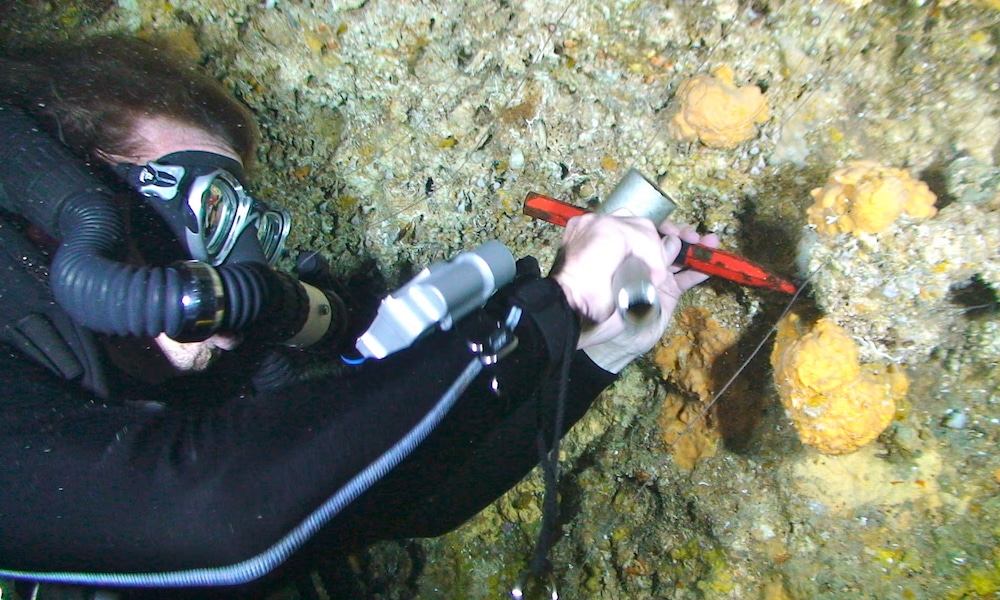This post was originally published on Eco Watch
A new study using marine sponges collected off the coast of Puerto Rico has found that the planet has already warmed more than 1.5 degrees Celsius.
Researchers analyzed ocean temperature records from sea sponges going back 300 years, a press release from The University of Western Australia (UWA) said. They concluded that global heating had actually increased by 0.5 degrees Celsius more than earlier estimates.
“So rather than the Intergovernmental Panel on Climate Change estimate of average global temperatures having increased by 1.2 degrees by 2020, temperatures were in fact already 1.7 degrees above pre-industrial levels,” said lead author of the study Malcolm McCulloch, who is a professor with the UWA Oceans Graduate School and Oceans Institute, in the press release. “If current rates of emissions continue, average global temperature will certainly pass 2 degrees by the late 2020s and be more than 2.5 degrees above pre-industrial levels by 2050.”
Sponges grow slowly in layers, so they can be studied like time capsules of periods before modern data, reported CNN.
For the study, the researchers used long-lived sclerosponges’ calcium carbonate skeletons to extract ocean temperature records, the press release said.
A researcher takes a specimen of Ceratoporella nicholsoni, which was used to calculate 300 years of warming. Clark Sherman / University of Puerto Rico at Mayagüez
“In particular, we examined changes in the amount of a chemical known as ‘strontium’ in their skeletons, which reflects variations in seawater temperatures over the organism’s life,” McCulloch said in The Conversation.
Using this process, the researchers — who were from UWA, University of Puerto Rico and Indiana State University – concluded that ocean temperatures began to rise in the mid-1860s.
“The sponge records showed nearly constant temperatures from 1700 to 1790 and from 1840 to 1860 (with a gap in the middle due to volcanic cooling). We found a rise in ocean temperatures began from the mid-1860s, and was unambiguously evident by the mid-1870s. This suggests the pre-industrial period should be defined as the years 1700 to 1860,” McCulloch said in The Conversation.
McCulloch said the findings of the study demonstrated that global heating — the combined average of land warming and ocean surface temperatures — had been underestimated by half a degree, primarily during the first stage of the industrial era when shipping coverage was still limited.
“[H]istorical temperature records for oceans are patchy. The earliest recordings of sea temperatures were gathered by inserting a thermometer into water samples collected by ships. Systematic records are available only from the 1850s – and only then with limited coverage. Because of this lack of earlier data, the Intergovernmental Panel on Climate Change has defined the pre-industrial period as from 1850 to 1900,” McCulloch said in The Conversation. “But humans have been pumping substantial levels of carbon dioxide into the atmosphere since at least the early 1800s. So the baseline period from which warming is measured should ideally be defined from the mid-1700s or earlier.”
McCulloch said the study also found that land surface warming has been accelerating more quickly, meaning even the two degree goal established by the Paris Agreement was at risk.
“Since the late 20th century, land-air temperatures have been increasing at almost twice the rate of surface oceans and are now more than 2°C above pre-industrial levels. This is consistent with well-documented decline in Arctic permafrost and the increased frequency around the world of heatwaves, bushfires and drought,” McCulloch said in The Conversation.
The study, “300 years of sclerosponge thermometry shows global warming has exceeded 1.5 °C,” was published in the journal Nature Climate Change.
“The now much faster rates of land-based warming also identified in the study are of additional concern, with average land temperatures expected to be about 4 degrees above pre-industrial levels by 2050,” McCulloch said in the press release. “Keeping global warming to no more than 2 degrees is now the major challenge, making it even more urgent to halve emissions by early 2030, and certainly no later than 2040.”
The findings of the study have been called into question by other scientists who say it has an excessive amount of limitations and uncertainties and could result in public confusion regarding climate change, CNN reported.
One of the main arguments against the accuracy of the findings is that the researchers used just one type of marine sponge from a single location to represent temperatures across the globe.
NASA climate scientists Gavin Schmidt said that — given the range of temperatures on Earth — estimating the average temperature worldwide requires data from the greatest number of locations possible.
“Claims that records from a single record can confidently define the global mean warming since the pre-industrial are probably overreaching,” Gavin said in a statement, as reported by CNN.
The study emphasizes the urgency of reducing fossil fuel emissions as quickly as possible.
“Our revised estimates suggest climate change is at a more advanced stage than we thought. This is cause for great concern,” McCulloch said in The Conversation. “It appears that humanity has missed its chance to limit global warming to 1.5°C and has a very challenging task ahead to keep warming below 2°C. This underscores the urgent need to halve global emissions by 2030.”
The post Controversial Study Says 1.5°C Warming Target Already Breached, ‘Underscores Urgent Need’ to Phase Out Fossil Fuels appeared first on EcoWatch.





0 Comments